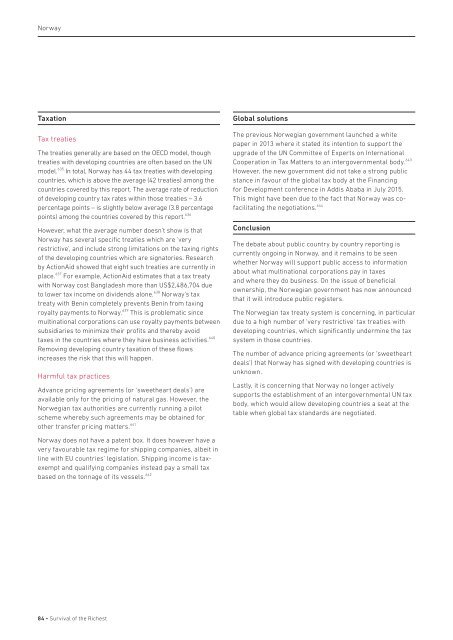You also want an ePaper? Increase the reach of your titles
YUMPU automatically turns print PDFs into web optimized ePapers that Google loves.
Norway<br />
Taxation<br />
Tax treaties<br />
The treaties generally are based on <strong>the</strong> OECD model, though<br />
treaties with developing countries are <strong>of</strong>ten based on <strong>the</strong> UN<br />
model. 635 In total, Norway has 44 tax treaties with developing<br />
countries, which is above <strong>the</strong> average (42 treaties) among <strong>the</strong><br />
countries covered by this report. The average rate <strong>of</strong> reduction<br />
<strong>of</strong> developing country tax rates within those treaties – 3.6<br />
percentage points – is slightly below average (3.8 percentage<br />
points) among <strong>the</strong> countries covered by this report. 636<br />
However, what <strong>the</strong> average number doesn’t show is that<br />
Norway has several specific treaties which are 'very<br />
restrictive', and include strong limitations on <strong>the</strong> taxing rights<br />
<strong>of</strong> <strong>the</strong> developing countries which are signatories. Research<br />
by ActionAid showed that eight such treaties are currently in<br />
place. 637 For example, ActionAid estimates that a tax treaty<br />
with Norway cost Bangladesh more than US$2,486,704 due<br />
to lower tax income on dividends alone. 638 Norway’s tax<br />
treaty with Benin completely prevents Benin from taxing<br />
royalty payments to Norway. 639 This is problematic since<br />
multinational corporations can use royalty payments between<br />
subsidiaries to minimize <strong>the</strong>ir pr<strong>of</strong>its and <strong>the</strong>reby avoid<br />
taxes in <strong>the</strong> countries where <strong>the</strong>y have business activities. 640<br />
Removing developing country taxation <strong>of</strong> <strong>the</strong>se flows<br />
increases <strong>the</strong> risk that this will happen.<br />
Harmful tax practices<br />
Advance pricing agreements (or ‘swee<strong>the</strong>art deals’) are<br />
available only for <strong>the</strong> pricing <strong>of</strong> natural gas. However, <strong>the</strong><br />
Norwegian tax authorities are currently running a pilot<br />
scheme whereby such agreements may be obtained for<br />
o<strong>the</strong>r transfer pricing matters. 641<br />
Global solutions<br />
The previous Norwegian government launched a white<br />
paper in 2013 where it stated its intention to support <strong>the</strong><br />
upgrade <strong>of</strong> <strong>the</strong> UN Committee <strong>of</strong> Experts on International<br />
Cooperation in Tax Matters to an intergovernmental body. 643<br />
However, <strong>the</strong> new government did not take a strong public<br />
stance in favour <strong>of</strong> <strong>the</strong> global tax body at <strong>the</strong> Financing<br />
for Development conference in Addis Ababa in July 2015.<br />
This might have been due to <strong>the</strong> fact that Norway was c<strong>of</strong>acilitating<br />
<strong>the</strong> negotiations. 644<br />
Conclusion<br />
The debate about public country by country reporting is<br />
currently ongoing in Norway, and it remains to be seen<br />
whe<strong>the</strong>r Norway will support public access to information<br />
about what multinational corporations pay in taxes<br />
and where <strong>the</strong>y do business. On <strong>the</strong> issue <strong>of</strong> beneficial<br />
ownership, <strong>the</strong> Norwegian government has now announced<br />
that it will introduce public registers.<br />
The Norwegian tax treaty system is concerning, in particular<br />
due to a high number <strong>of</strong> 'very restrictive' tax treaties with<br />
developing countries, which significantly undermine <strong>the</strong> tax<br />
system in those countries.<br />
The number <strong>of</strong> advance pricing agreements (or ‘swee<strong>the</strong>art<br />
deals’) that Norway has signed with developing countries is<br />
unknown.<br />
Lastly, it is concerning that Norway no longer actively<br />
supports <strong>the</strong> establishment <strong>of</strong> an intergovernmental UN tax<br />
body, which would allow developing countries a seat at <strong>the</strong><br />
table when global tax standards are negotiated.<br />
Norway does not have a patent box. It does however have a<br />
very favourable tax regime for shipping companies, albeit in<br />
line with EU countries’ legislation. Shipping income is taxexempt<br />
and qualifying companies instead pay a small tax<br />
based on <strong>the</strong> tonnage <strong>of</strong> its vessels. 642<br />
84 • <strong>Survival</strong> <strong>of</strong> <strong>the</strong> <strong>Richest</strong>


